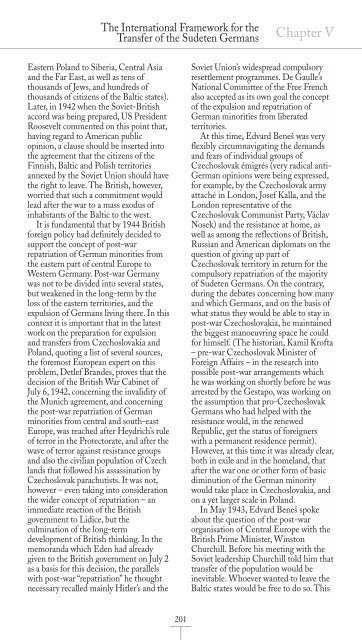the nationality of all inhabitants of the czech provinces and ...
the nationality of all inhabitants of the czech provinces and ...
the nationality of all inhabitants of the czech provinces and ...
You also want an ePaper? Increase the reach of your titles
YUMPU automatically turns print PDFs into web optimized ePapers that Google loves.
Eastern Pol<strong>and</strong> to Siberia, Central Asia<br />
<strong>and</strong> <strong>the</strong> Far East, as well as tens <strong>of</strong><br />
thous<strong>and</strong>s <strong>of</strong> Jews, <strong>and</strong> hundreds <strong>of</strong><br />
thous<strong>and</strong>s <strong>of</strong> citizens <strong>of</strong> <strong>the</strong> Baltic states).<br />
Later, in 1942 when <strong>the</strong> Soviet-British<br />
accord was being prepared, US President<br />
Roosevelt commented on this point that,<br />
having regard to American public<br />
opinion, a clause should be inserted into<br />
<strong>the</strong> agreement that <strong>the</strong> citizens <strong>of</strong> <strong>the</strong><br />
Finnish, Baltic <strong>and</strong> Polish territories<br />
annexed by <strong>the</strong> Soviet Union should have<br />
<strong>the</strong> right to leave. The British, however,<br />
worried that such a commitment would<br />
lead after <strong>the</strong> war to a mass exodus <strong>of</strong><br />
<strong>inhabitants</strong> <strong>of</strong> <strong>the</strong> Baltic to <strong>the</strong> west.<br />
It is fundamental that by 1944 British<br />
foreign policy had definitely decided to<br />
support <strong>the</strong> concept <strong>of</strong> post-war<br />
repatriation <strong>of</strong> German minorities from<br />
<strong>the</strong> eastern part <strong>of</strong> central Europe to<br />
Western Germany. Post-war Germany<br />
was not to be divided into several states,<br />
but weakened in <strong>the</strong> long-term by <strong>the</strong><br />
loss <strong>of</strong> <strong>the</strong> eastern territories, <strong>and</strong> <strong>the</strong><br />
expulsion <strong>of</strong> Germans living <strong>the</strong>re. In this<br />
context it is important that in <strong>the</strong> latest<br />
work on <strong>the</strong> preparation for expulsion<br />
<strong>and</strong> transfers from Czechoslovakia <strong>and</strong><br />
Pol<strong>and</strong>, quoting a list <strong>of</strong> several sources,<br />
<strong>the</strong> foremost European expert on this<br />
problem, Detlef Br<strong>and</strong>es, proves that <strong>the</strong><br />
decision <strong>of</strong> <strong>the</strong> British War Cabinet <strong>of</strong><br />
July 6, 1942, concerning <strong>the</strong> invalidity <strong>of</strong><br />
<strong>the</strong> Munich agreement, <strong>and</strong> concerning<br />
<strong>the</strong> post-war repatriation <strong>of</strong> German<br />
minorities from central <strong>and</strong> south-east<br />
Europe, was reached after Heydrich’s rule<br />
<strong>of</strong> terror in <strong>the</strong> Protectorate, <strong>and</strong> after <strong>the</strong><br />
wave <strong>of</strong> terror against resistance groups<br />
<strong>and</strong> also <strong>the</strong> civilian population <strong>of</strong> Czech<br />
l<strong>and</strong>s that followed his assassination by<br />
Czechoslovak parachutists. It was not,<br />
however – even taking into consideration<br />
<strong>the</strong> wider concept <strong>of</strong> repatriation – an<br />
immediate reaction <strong>of</strong> <strong>the</strong> British<br />
government to Lidice, but <strong>the</strong><br />
culmination <strong>of</strong> <strong>the</strong> long-term<br />
development <strong>of</strong> British thinking. In <strong>the</strong><br />
memor<strong>and</strong>a which Eden had already<br />
given to <strong>the</strong> British government on July 2<br />
as a basis for this decision, <strong>the</strong> par<strong>all</strong>els<br />
with post-war “repatriation” he thought<br />
necessary rec<strong>all</strong>ed mainly Hitler’s <strong>and</strong> <strong>the</strong><br />
The International Framework for <strong>the</strong><br />
Transfer <strong>of</strong> <strong>the</strong> Sudeten Germans<br />
201<br />
Chapter V<br />
Soviet Union’s widespread compulsory<br />
resettlement programmes. De Gaulle’s<br />
National Committee <strong>of</strong> <strong>the</strong> Free French<br />
also accepted as its own goal <strong>the</strong> concept<br />
<strong>of</strong> <strong>the</strong> expulsion <strong>and</strong> repatriation <strong>of</strong><br />
German minorities from liberated<br />
territories.<br />
At this time, Edvard Beneš was very<br />
flexibly circumnavigating <strong>the</strong> dem<strong>and</strong>s<br />
<strong>and</strong> fears <strong>of</strong> individual groups <strong>of</strong><br />
Czechoslovak émigrés (very radical anti-<br />
German opinions were being expressed,<br />
for example, by <strong>the</strong> Czechoslovak army<br />
attaché in London, Josef K<strong>all</strong>a, <strong>and</strong> <strong>the</strong><br />
London representative <strong>of</strong> <strong>the</strong><br />
Czechoslovak Communist Party, Václav<br />
Nosek) <strong>and</strong> <strong>the</strong> resistance at home, as<br />
well as among <strong>the</strong> reflections <strong>of</strong> British,<br />
Russian <strong>and</strong> American diplomats on <strong>the</strong><br />
question <strong>of</strong> giving up part <strong>of</strong><br />
Czechoslovak territory in return for <strong>the</strong><br />
compulsory repatriation <strong>of</strong> <strong>the</strong> majority<br />
<strong>of</strong> Sudeten Germans. On <strong>the</strong> contrary,<br />
during <strong>the</strong> debates concerning how many<br />
<strong>and</strong> which Germans, <strong>and</strong> on <strong>the</strong> basis <strong>of</strong><br />
what status <strong>the</strong>y would be able to stay in<br />
post-war Czechoslovakia, he maintained<br />
<strong>the</strong> biggest manoeuvring space he could<br />
for himself. (The historian, Kamil Kr<strong>of</strong>ta<br />
– pre-war Czechoslovak Minister <strong>of</strong><br />
Foreign Affairs – in <strong>the</strong> research into<br />
possible post-war arrangements which<br />
he was working on shortly before he was<br />
arrested by <strong>the</strong> Gestapo, was working on<br />
<strong>the</strong> assumption that pro-Czechoslovak<br />
Germans who had helped with <strong>the</strong><br />
resistance would, in <strong>the</strong> renewed<br />
Republic, get <strong>the</strong> status <strong>of</strong> foreigners<br />
with a permanent residence permit).<br />
However, at this time it was already clear,<br />
both in exile <strong>and</strong> in <strong>the</strong> homel<strong>and</strong>, that<br />
after <strong>the</strong> war one or o<strong>the</strong>r form <strong>of</strong> basic<br />
diminution <strong>of</strong> <strong>the</strong> German minority<br />
would take place in Czechoslovakia, <strong>and</strong><br />
on a yet larger scale in Pol<strong>and</strong>.<br />
In May 1943, Edvard Beneš spoke<br />
about <strong>the</strong> question <strong>of</strong> <strong>the</strong> post-war<br />
organisation <strong>of</strong> Central Europe with <strong>the</strong><br />
British Prime Minister, Winston<br />
Churchill. Before his meeting with <strong>the</strong><br />
Soviet leadership Churchill told him that<br />
transfer <strong>of</strong> <strong>the</strong> population would be<br />
inevitable. Whoever wanted to leave <strong>the</strong><br />
Baltic states would be free to do so. This


